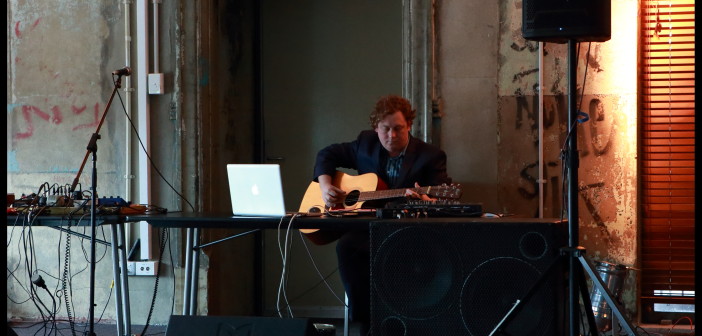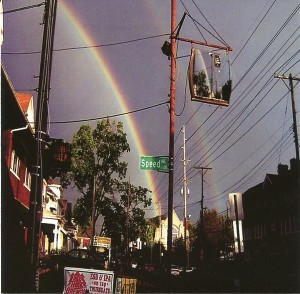Brisbane based Andrew Tuttle makes music that explores the relationship between instrumentation, structure and genre. Or at least that’s what his biography on his website says. Prior to 2013 he recorded under the name Anonymeye, under which he recorded 3 highly idiosyncratic albums. With steel strings guitars, banjo, synthesizers and various other electronics, he would regularly mine the space between sound design and musicality, creating lush, highly immersive sonic landscapes. His latest album is Slowcation, (released on A Guide to Saints, a tape offshoot of Lawrence English’s Room40 label) and he continues in this vein, exploring and merging acoustic instrumentation, synthesis and signal processing. Featuring collaborations with M.C Schmidt (Matmos) and Christopher Fleeger, it’s a highly edited, yet strangely soothing work, that is beguiling as it is experimental. With such a myriad of influences and approaches spilling out into his sounds, Cyclic Defrost took the opportunity to ask Tuttle to come up with some of the music that has moved him over the years.
The Carter Family – Roots Of Country (Music Club)
There’s so many pre-war blues and folk artists and compilations I could have listed, from Dock Boggs to Charlie Patton to the Harry Smith anthologies and so on ad infinitum. Whilst the mystique of some of these artists is alluring – in addition to their wonderful haunting songs – I love how The Carter Family had the success and discography to highlight how this music was the popular music of its year. That the classic Carter Family existed throughout the inter-war years (including the formation and eventual dissolution of the League of Nations, the Great Depression, New Deal, isolationism, slide into WWII), meant they were able to write and collect songs reflecting the abject misery and boundless optimism of the era. The Carter Family can make me beam with happiness and within an instant ponder the inexorable forces of humanity and nature. Why this particular album? There’s a bazillionty compilations but out of the small fraction that I have picked up, this is my favourite.
Tony Conrad and Faust – Outside The Dream Syndicate (Table of the Elements)
After earlier introductions via more contemporary artists, I first dived head on into the Early Minimalism canon when I moved to Melbourne in my early 20s, spending a lot of time listening to Feldman, Riley, Stockhausen, OHM compilations, and so on. Conrad’s work, and From the Side of Man and Womankind in particular was a revelation for me, a piece which depending on my mood could happily continue forever. I could have chosen one of Conrad’s solo works, but Outside The Dream Syndicate is my favourite to listen to and to imagine being made. The absolute discipline and durational focus of side one, and the more cosmic counterpart on side two, continue to be interesting decades after the original release. I must admit that I was deeply underwhelmed in Faust’s performance at Melbourne International Jazz Festival in 2011, however Tony Conrad’s performance with Charlemagne Palestine that same weekend and his lecture at 3RRR have both really stuck with me.
Lawrence English – Wilderness Of Mirrors (Room40)
I could have picked any number of releases from Room40 or it’s A Guide To Saints or Someone Good sibling labels, such is the profound impact that Lawrence English and Room40 have had on me over the years. I first met Lawrence at a workshop in the outer suburbs of Brisbane that I grew up in, back when I was in my teens and Lawrence probably in his early 20s. I can’t pick the exact year, but Room40 would have had to been very new. Lawrence has been a great mentor to me since, as a sounding board for making music, organising tours and everything in between. In recent years I’ve performed with him in group situations on a few occasions as well as getting him to master and/or mix several releases of mine under my own name as well as when I performed as Anonymeye. What I’ve always enjoyed with Room40 shows and releases (as well as with the discographies of many of the artists in my list) is that they are challenging and varied, and that I’m absolutely not going to like them all – or at the very least, appreciate them on first listen. There’s been countless performances which I have absolutely loved over the last 15 years though – too many to even think about, let alone list. So many formative sonic adventures. It is so easy to avoid risktaking in creative pursuit, and I’ve always really respected Lawrence’s dedication to creating a listening environment that is open, engaging and not complacent. With this album in particular, there was a point a couple of years ago where Lawrence started releasing works which weren’t just interesting, but truly world class. Wilderness Of Mirrors, released in 2014, at times described as ambient, is to me anything but – there’s a catharsis and primal energy that means I can’t engage with it when trying to work or walk or drive.
John Fahey – America (Takoma)
Another artist where I had a lot of choice, so many Fahey albums and compilations, but America is my ultimate go to. I was introduced to Fahey’s work via the Return Of The Repressed 2CD set, but America is the album that I listen to the most. The guitar sound throughout the album is beautiful, and there is something that is really pure and also uncomplicated about the way that Fahey plays on the album. Not uncomplicated as in simple (I sure can’t play like him that’s for sure) but it isn’t showy. Great mix between shorter works and some 10-15 minute epics. The title track, particularly about 3 minutes in, just blows me away every time. Whilst there was probably more homage when I was recording as Anonymeye than what I have been creating under my own name, the tunings I use on acoustic instruments I first heard through researching his work.
Gonzales – Presidential Suite (Kitty-Yo)
My interest in Gonzales since the release of this album has waxed and waned over the years, however this album is still as vital and fresh sounding to my ears as the day I first heard it. Presidential Suite is so playful, grandiose, silly and self-aware, but Chilly’s melodies and productions on this album have a real emotional resonance at times as well. Mainly though, it is still so fun to listen to. I’m not a lyrics guy in general, but I could probably remember my way through this whole album. Seeing Gonzales with Feist and Taylor Savvy as a wide eyed 18 year old in 2003 was definitely something else, as well.
Hole – Live Through This (Geffen)
Hard to pick just the one ‘formative’ teenage years album. There’s so many bands I could have picked that influenced me one way or the other (Sonic Youth, Pavement, Nirvana, Sekiden, Not From There, many others of equal and far lesser quality), this is an album I first heard in my high school years that I probably still regularly listen to the most. Sure, a bit incongruous with some of the albums on this list, but Live Through This still sounds so good to me – fantastic songs and incredibly subtle/suitable production. I can’t listen to any other Hole albums anymore, but Live Through This is still an absolute winner for me.
R. Keenan Lawler – Music For The Bluegrass States (Xeric)
One of the things that hits me so hard about about music, is the sense of wonder and discovery. Wonder, in that this album is so fascinating and unique – I can pick the reference points, the instrumentation, the tuning, some of the performance methods – but it still sounds new and unfamiliar every time. Musical discoveries that you just don’t expect are always so exciting, and this album definitely fits in that category. I can’t remember how, when, or where I was introduced to this album, but who or whatever it was, thank you. As far as I’m aware, Keenan hasn’t released much if any new music to the world since this album, but I think continues to perform in Louisville. I don’t know what constitutes a ‘lost classic’, but if I ever become an accidental mogul in future years, this is one of many albums that I’d love to share with the world further. Not that it wasn’t ever noticed, if it can make it halfway around the world, it can be heard anywhere. One of those people who I hope to make music with one day, or at the very least, talk about it for hours.
Matmos – The Rose Has Teeth In The Mouth Of The Beast (Matador)
Matmos are probably my favourite band, and have been for a very long time. I first heard them after the release of A Chance To Cut Is A Chance To Cure, I think via some Matador compilations. Another in this list where it was easy to select the artist, but difficult to select the album (The Marriage Of True Minds and The Civil War would also make my winners podium, but really their discography is an all-winner event). The Rose Has Teeth… is such a great example of Matmos’ combination of creative innovation, attention to detail, brilliant construction of music, risk taking, and humour. The album is able to be appreciated at face value, but the incredibly detailed concepts and methods used to create the album is interesting on another whole level. As a side note, as a long time fan, it was quite a thrill, and a bizarre feeling, to be invited to perform with them (in the ‘Ed Schrader’ role for the track Very Large Green Triangles) on their Australian tour in 2014. Considering I had blackout sunglasses and headphones on, it was even weirder to be in Matmos before I saw Matmos. In the last year or so I’ve been fortunate to spend some time with Drew and Martin in both Australia and the USA. An absolute pleasure – they’re lovely gents who humoured my terrible jokes and propensity to go on about sport too much.
(The) Monks – Black Monk Time (Polydor)
I’ve got a weird relationship with ‘60s music’. My parents didn’t listen to much music at home (although they did have original 45s and LPs of the rock’n’roll canon from their teenage years, and they both saw most of the ‘big names’), so I was never really exposed to the Stones, Beatles, Beach Boys, Hendrix, etc in the way that many others were. Even now, I’m not particularly fussed (at best) musically on a lot of ‘the greats’, as interesting (if overplayed) their stories can be. It isn’t a case of being a contrary jerk, just a lack of interest (there’s things I do like, things I don’t, a lot of contradiction). I’ve tried, but never been able to engage. One rock album from the 60s that has continued to interest me though was Black Monk Time, the only studio album by Monks. It is incredibly weird (particularly when considering the time/place/context in which it was released), but also without being too obviously snarling or self-aware. I can’t remember when I first heard the album (sometime 2004-06?) but remember that it absolutely blew me away. The album sounds so vital, angry, and bewildered – befitting a group of American GIs in Germany in the 60s creating music and lyrics that combine British beat music, abstract German contemporaries and American pop music. Black Monk Time veers back and forth between internal desolation, anger at the world and songs about girls – sometimes wildly. For me, Black Monk Time just pipped The Wipers’ Is This Real? on this list, but there’s definitely some similarities between the two albums. Completely ignored at the time, incredibly influential – and there’s been a lot of reissues over the years (both legitimate and dodgy), with tracks added and deleted almost at will. Black Monk Time reissues without the extra/later studio tracks, demos or live tracks are definitely my preference.
Keith Fullerton Whitman – Playthroughs (Kranky)
Probably an early introduction into microtonal music for me, KFW’s Playthroughs is still a landmark album that continues to leave an impression on me. There’s a shimmering beauty to the album which rewards intensive listening; and is also the kind of album that would have been absolutely laboured over it… it sounds like it was intensely planned out, but also sounds completely effortless. One of those baffling and wonderful paradoxes. I’ve seen Keith perform twice over the years, and the performance he did around the time of this album was something really inspiring in itself. It was a true multisensory experience to hear such minimal music, which I had largely listened to lying down and/or with headphones, be so loud and physical. I’ve been to a lot of shows before and since, but it still left an impression.
Andrew Tuttle’s Slowcation is available now through A Guide to Saints.





